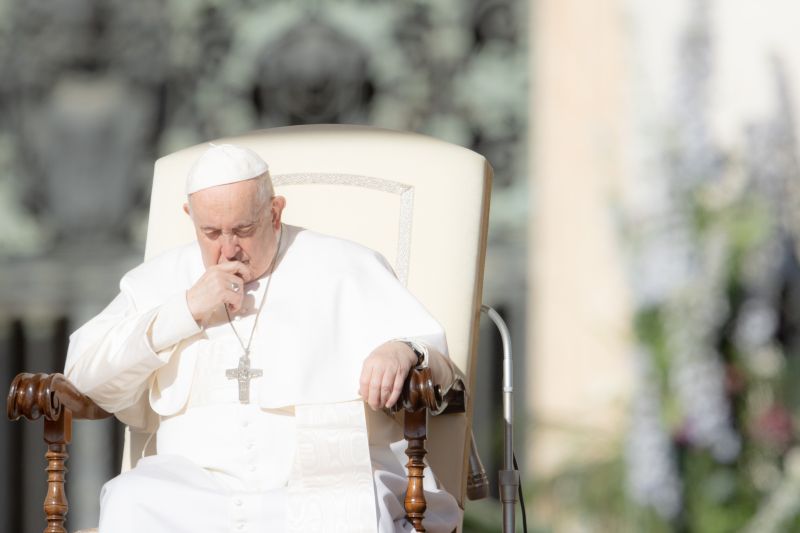
Denver, Colo., May 2, 2023 / 14:00 pm (CNA).
Pope Francis’ prayer intention for the month of May is for ecclesial movements and groups.
“Ecclesial movements are a gift; they are a treasure in the Church,” the Holy Father said in a video released by the Vatican on May 2.
“These movements renew the Church with their capacity for dialogue at the service of her evangelizing mission,” he said. “Each day, they rediscover in their charism new ways of showing the attractiveness and the newness of the Gospel.”
“How do they do this? Speaking different languages, they seem different, but it is their creativity that creates these differences. But always understanding themselves and making themselves understood.”
He added: “Always be on the move, responding to the impulse of the Holy Spirit to the challenges, to the changes in today’s world.”
Pope Francis encouraged members of ecclesial groups to “remain in harmony with the Church, since harmony is a gift of the Holy Spirit.”
The pope concluded his message with a prayer: “Let us pray that ecclesial movements and groups may daily rediscover their mission, an evangelizing mission, and that they place their own charisms at the service of the world’s needs.”
Pope Francis’ prayer video is promoted by the Pope’s Worldwide Prayer Network, which raises awareness of monthly papal prayer intentions.
If you value the news and views Catholic World Report provides, please consider donating to support our efforts. Your contribution will help us continue to make CWR available to all readers worldwide for free, without a subscription. Thank you for your generosity!
Click here for more information on donating to CWR. Click here to sign up for our newsletter.





We read: Pope Francis encouraged members of ecclesial groups to ‘remain in harmony with the Church, since harmony is a gift of the Holy Spirit.’” YES, “harmony with the Church…” But also been thinkin’ ’bout the Holy Spirit and the polyglot Synodal Casserole!
The Vatican keyed its external and provisional agreement with China to the example of “patience” lifted from former Secretary of State Cardinal Casaroli (instructive coincidence of terms, this!). https://www.pillarcatholic.com/p/pope-francis-said-cardinal-casaroli-is-his-diplomatic-model-so-who-was-cardinal-casaroli
Two straight questions, plus an x-ray of shallow-dish Synodal Casserole:
QUESTION: Are we to expect the Synodal Casserole to have the same flat flavor as the transplanted policy of “patience” from Casaroli in Eastern Europe, and now the sinicized Church? Same policy, same concessions, probably “provisional,” and same outcome?
QUESTION: Wondering, however, if the novelty of lay members of the Synod on Synodality in October 2023 might actually introduce the clerics to the parental notion of “tough love”? The long-awaited, real, and growth-enabling “gift of the Holy Spirit”?
X-RAY: A quarter of a century ago, FR. STANLEY L. JAKI (1924-2009) anticipated the margarine-spread “patience” atop our polyglot Synodal Casserole:
“Those theologians, almost to a man latter-day modernist critics of papal infallibility, seem to overlook a very curious difference between Newman and themselves. While Newman humbly confessed that he had never sinned against the Holy Spirit, they boldly speak in the name of that Spirit. But as all too often in the past, the step from Heiliger Gest (Holy Spirit) to Zeitgeist (spirit of the times) is a very short step. And what if that spirit is merely the Geist to which Hegel paid supreme homage, but which turned out to be his own sadly fallible mind trapped in the labyrinths not so much of its own evolution as of its endless convolutions” (“And on this Rock,” Christendom Press, 1997, p. 118).
Maybe the Synod will give a harmonious ear to the adults in the room–whether seasoned lay people or even shepherd-clerics! The ingredient virtue of “patience,” but also salted with the needed governance of “tough love”?
G.K. CHESTERTON — “Merely having an open mind is nothing. The object of opening the mind, as of opening the mouth, is to shut it again on something solid.”
The Pilgrim Church is a healthy movement forward. Ecclesial movements are expressions of vitality and dynamism. Moving on is far healthier than embracing “stuckedness.”
“Forward?” And then there are those who say that a fixation on change is the most rigid and “stucked” rut of all. The tired world awaits a truly balanced dialogue (!) inclusive (!) of this insight. T.S. Eliot gives us at least a non-ideological starting point about both “stucknesses”:
“We are always faced both with the question ‘what must be destroyed?’ and with the question ‘what must be preserved?’ and neither Liberalism nor Conservatism, which are not philosophies and may be merely habits, is enough to guide us” (“The Idea of a Christian Society,” 1940).